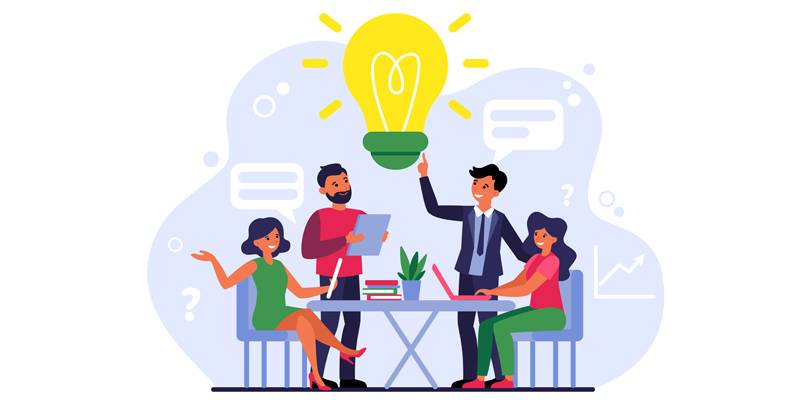Soft and steady wins the race!

Ever wondered why and how the pattern of writing our job resumes over the years has changed so drastically? How, from just a basic listicle stating our qualifications, we have now evolved to describing our soft skills and laying great emphasis on our attributes? This article unravels the intricate paradigm shift of the supremacy between emotional and intelligence quotient at the workplace.
You could be a bright student graduating at the top of your class, having tons of practical experience, and still not be able to ace that one interview or get promoted to the next level at your present firm, without the right soft skills to push you forward. Let us first break down what soft skills are and how do they come to play an eminent role at the workplace.
“Soft skills are intangible attributes related to how you work,” says Jennifer Smith, founder of Flourishing Careers. Broadly speaking, soft skills or interpersonal skills are the abilities an individual possesses, such as communicational skills, creative thinking, problem-solving attitude, leadership qualities, so on and so forth. In a social setting, every individual requires a certain set of skills to interact with fellow human beings in our day-to-day lives. However, some of these skills are given excess leverage, especially at the workplace, keeping in mind the nature of the work and the position the respective individual is employed in.
Why is it that most job descriptions have ‘great communication skills’ listed as a necessary element? Because the way a person interacts and is able to communicate things concisely at the workplace makes a huge difference in the way the work gets done. Imagine yourself in an official meeting where you have to give a presentation to a large group of people, would you rather have them listening to you rapt with attention or just sitting there distracted and bored?
To accomplish the former, you have to possess great communication skills and the confidence that leads you to carry the entire presentation effortlessly. But, this is often not as simple as it seems. For instance, you cannot show up to your first job interview with the words “Excellent Leadership” brandished across your resume, and expect your interviewer to take your word for it without the said leadership skills demonstrated.
The focus had always been on students to excel at acquiring hard skills and increasing their IQ or intelligence quotient. The sudden shift of importance given to EQ or emotional quotient is testimony to the fact that individuals are foremost social beings, over and above everything. Hard skills that were once required and deemed essential to fulfil a task are now obsolete thanks to the ever-growing use of technology. But soft skills like being a ‘hard worker’ and ‘fast learner’, will never cease to be of use.
The inherent need for an individual to possess both sets of skills is as intricately woven as the unsaid need for one to always succeed and be on the top in life. We often forget that both hard skills and soft skills are acquired over a period of time and are never guaranteed to remain stagnant in a constantly changing environment.
Self-awareness
Knowing when to press pause during a heated argument, taking a step back to evaluate the situation and trusting your gut instinct before arriving at a decision, being able to capitalise on one’s own strengths and weaknesses, are all examples of what it means to be self-aware, especially at the workplace.
Foremost immanent is the fact that we acknowledge the implicit need for individuals to manage and tactfully approach their emotions at the workplace. This itself constitutes a large portion of what having emotional intelligence means. A person showcasing a higher aptitude for emotional intelligence is much more likely to be hired, promoted and liked by her/his peers and team members than an individual who doesn’t. Such is the case because having a higher emotional intelligence enables an individual to communicate better and understand one’s and others’ needs. To elucidate further, given below are some of the characteristics an individual must have for a higher EQ.
Self-regulation
Much like self-awareness, self-regulation stems from the same root of being able to control and regulate one’s emotions. Having a sound mind at the workplace where you don’t lose your cool in a tense situation and think before you act, is always a trait that is revered by all. Soft skills such as ‘ability to perform under pressure’, ‘integrity’, ‘thoughtful nature’ are all byproducts of self-regulation.
Empathy
Perhaps the most paradoxical trait to have at the workplace, empathy broadly refers to knowing what it’s like to be in another’s shoes. It translates to understanding and relating to the other’s emotions, wants, needs and viewpoints. Although a superior trait to have in general, it can act as a paradoxical trait at the workplace owing to certain roles and situations that requires one to use their business acumen and management skills over empathetic ones.
Motivation
Although difficult to maintain throughout, people with high EQ are always motivated to give their best and strategically invest in long-term successes, even if that means having to forego immediate results. Motivation forms a key ingredient to be driven for the end result at the workplace.
Social skills
Another excellent skill to possess, social skills are the roadmap for an individual to become a great orator and a people person. An often-cited stereotype, that is true for the most part, remains for hard-working introverts who lag in excelling at the work front due to their lack of social skills. While there are innumerable professional and certified ways for us to increase our hard skills, there are very few certified courses that help us in ameliorating our soft skills and emotional intelligence.
Despite the written word, emotional intelligence is often deemed to be a quality that one can master only through lived experiences. This brings us to the next segment, where we focus on how soft skills can be built upon to further excel in emotional intelligence. There are two routes that we can go about accelerating the pedal here.
First, with the help of online supplements such as Assessments, to know which soft skills are your strong suit and which aren’t. Guided psychological assessments are a great way to know about one’s practical and emotional strengths and weaknesses. The second route is a more hands-on approach, where the individual must learn by throwing oneself in practical experiences, such as looking at past feedback and/or performance at the work front or other sources for leads. Identifying which skills were required for a job interview/promotion that they didn’t get and work towards accomplishing them.
Power of observation
Observing a social situation and learning about the key fight or flight responses. How can one tackle a situation of conflict without fleeing and still being a winner?
Role playing
Practising soft skills through the art of role-playing in mock situations. For instance, if an individual is poor at communication and is afraid of public speaking, then they should start small and volunteer for a short presentation with their team members to work upon it.
Training
Many senior and reputed organisations and multinational companies invest heavily in getting their team members trained for the job. Learning and Development is an ongoing process and often an eminent department at most firms.
Lastly, many industries now consider an aptitude test for emotional intelligence to be broadened and made the central determinant when hiring for a job. This tactical shift in the paradigm of emotional intelligence’s supremacy at the base of all our actions is exactly why “soft and steady wins the race”.






